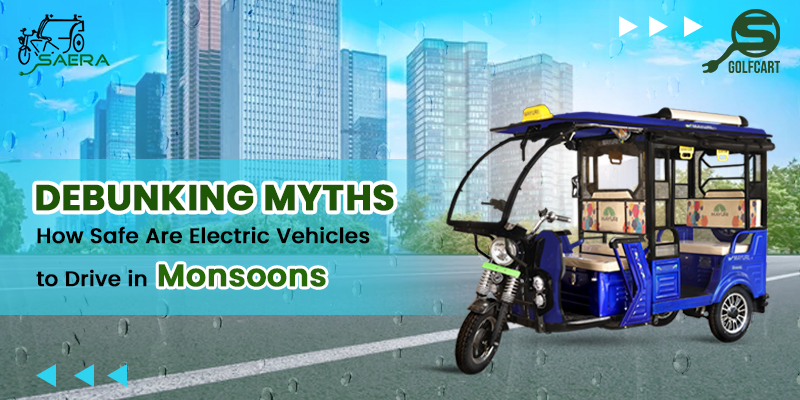We all have learned a lesson in our school about electricity and water, right? It can be fatal if they come together. This is because the water we see around us contains electrolytes, making it an excellent conductor of electricity. Therefore, it makes sense that we are advised to keep electrical and water sources apart. Because of this, there is a logical issue surrounding the safety of electric vehicles in wet or monsoon situations.
In fact, several myths and concerns persist, especially when it comes to their performance in adverse weather conditions like monsoons. In this blog, we will focus on debunking these myths and discussing the safety of electric vehicles, specifically battery-operated e-rickshaw loaders, during the rainy season.
Myth: Electric Vehicles Are Prone to Water Damage
Reality: This is one of the most common myths surrounding electric vehicles. But the reality is that nowadays electric vehicle manufacturers are designed to meet stringent safety and performance standards. They are equipped with sealing and waterproofing technologies that help protect crucial electric vehicle components from damage.
Furthermore, these vehicles typically have IP (Ingress Protection) ratings that indicate their ability to resist water ingress. This means they can withstand heavy rain without any damage to their electrical systems.
Myth: EVs are more vulnerable to accidents in heavy weather due to battery problems.
Reality: The idea that electric vehicles are more likely to be involved in accidents during heavy rains is one of the long-standing fallacies about them being unsafe to drive during the monsoon. Modern electric vehicles are made to adhere to strict safety regulations, which include safeguards against water intrusion. The battery packs are completely sealed and watertight, which greatly increases their resistance to water infiltration.
Myth: It is risky to charge an electric vehicle in the rain.
Reality: Because rainwater conducts energy, people are afraid to charge their electric vehicles in the rain. Fortunately, waterproof electric car chargers are available that are made with both the vehicle and its occupants’ safety from electrical shock in mind. Chargers for electric vehicles, including battery-operated e rickshaw loaders, must pass strict tests and adhere to a set of safety standards. Additionally, waterproofing electrical connectors and other electric equipment is a fairly common practice.
Myth: Battery Performance Suffers in Monsoons
Reality: The belief that electric vehicle batteries suffer in monsoon conditions is another common myth. While extreme temperatures can affect battery performance, rainy weather itself is not detrimental to EV batteries. In fact, the temperature-regulated environment of EVs helps maintain the battery’s performance within an optimal range.
That said, it’s important to ensure that electric rickshaws and e-loaders are adequately protected from heavy rain and flooding when parked or not in use. Proper maintenance and care are essential for ensuring the longevity of EV batteries.
Suggested Read: Introducing the Smartest Range of Electric Vehicles!
The Bottom Line
Undoubtedly, electric vehicles, including electric rickshaws and e-loaders, are safe and reliable options for driving during the monsoon season. So, if you’re looking to invest in buying an e-rickshaw or e-loader, trust Saera Electric Auto.
Being one of the best electric vehicle manufacturers in India, bringing electric vehicles with advanced technologies to ensure safety and efficiency. Indeed, our electric vehicles are well-equipped to handle rainy weather, and drivers can enjoy the benefits of eco-friendly transportation. Visit us to explore our wide range of products today.

